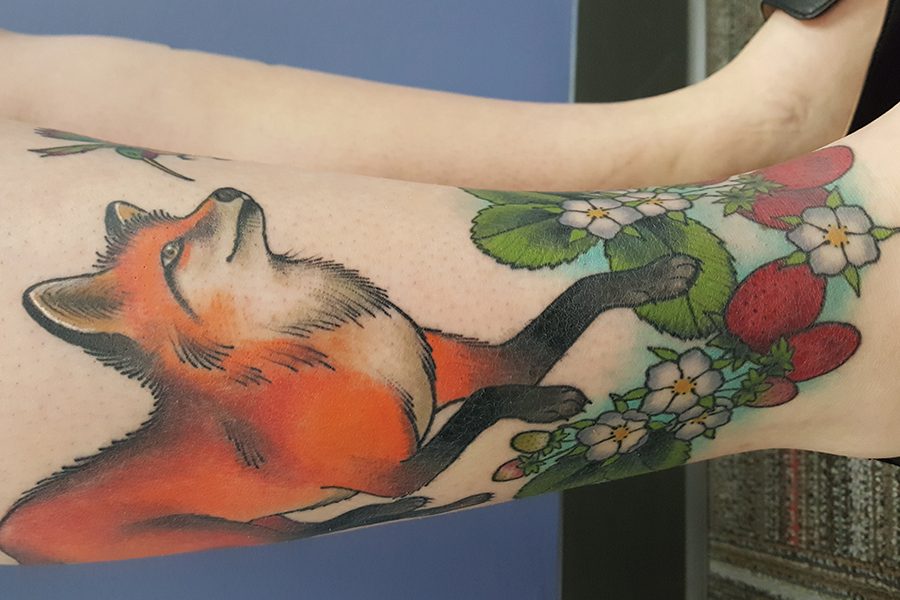Talking about people’s tattoos
March 22, 2017
I personally can’t believe it, but spring is finally here. With the warmer weather comes more bared skin. Tattoos previously covered by parkas and scarfs are now on display, meaning that people with tattoos are receiving more attention. Though some who comment on tattoos are courteous, others are quite annoying, and verge on being rude. From my experience of being a tattooed woman myself, I’ve noticed that a lot of these faux-pas are rooted in not knowing how to talk to someone with tattoos, rather than purposely insulting them.
In order to do my part to prevent obnoxious commentary on tattoos this season, myself and two other Madison College students named Chelsea Thompson and Adrian Molitor have created a guide for you about the most commonly asked questions we get asked about our tattoos, and why they bother us.
One thing to keep in mind is that people with tattoos are constantly being asked the same questions over and over again by strangers. Most likely, we will continue to be asked these questions for the rest of our lives. So, these questions might seem somewhat harmless at first, but over time they become very redundant. Not only does the redundancy bother us, but the context that they are asked in can often be inappropriate. We will often be stopped in the street so strangers can ask us a question when we are trying to run and catch our bus. Sometimes our conversations with friends or family are interrupted so someone can comment on our ink. With that said, here are some of the most frequent questions that tattooed people get that most of us would be happy if we did not get asked again.
The first most commonly asked question is, “Did it hurt?” In the eloquent words of Thompson, “Duh.” Being tattooed means being poked with a needle for what can sometimes be hours on end. We knew it was going to hurt, but we decided to make the commitment regardless.
The next commonly asked question is, “Can I touch it?” The answer will depend on the person being asked, but, in general, the answer is “no.” This question is bewildering, because it has two implications: 1. That the asker believes that tattooed skin feels different than “virgin” skin (spoiler: it does not), and 2. The asker thinks that it is normal to touch a stranger. Despite these implications, it is better than the alternative, which is the stranger touching without asking. All three of us have had experience with this, which tells me that most people with tattoos must have as well. I feel upset that I have to say this: do not touch people without asking. Ever.
Another frequently asked question is “What does it mean?” Though some tattoos do have a meaning, many do not. Sometimes the meaning is in the process. For example, Thompson reaches for tattoos in times of turmoil, describing the experience as opting to go to the tattoo shop rather than a therapist’s office. Sometimes the meaning is in the connotation of being inked. For Molitor, he has found his tattoos as a “neutral ground for people who suffer.” His tattoos represent a commitment and effort to empathize with marginalized people. Sometimes the meaning lies in the commitment. For me, my tattoos represent a commitment to art. I value the idea of sacrificing my skin to be a canvas for artistic expression.
Sometimes commentary on tattoos passes the line from annoying to problematic. This is often due to an intersectionality of different identities mixed with being someone who is tattooed. For example, being a woman with tattoos brings on an influx of people who feel comfortable objectifying my body because it has ink on it. Most recently, a man followed me downtown until I stopped to talk about my tattoos with him. I felt genuinely frightened in this moment. It is upsetting that people see tattoos as a free pass to harass others.
However, there are some ways to compliment a person with tattoos politely. The first thing to think about if you want to compliment someone is the context. For example, is this a person you are already in a casual conversation with? Go for it. Is the person a stranger who looks like they are in a rush? Keep the compliment to yourself. Once the context is determined, and you want to continue to compliment a tattoo, focus on the artistry rather than the anatomy. Saying “that coloring is gorgeous!” is way more comfortable than “You have beautiful arms!”
The one question that all three of us found acceptable to ask someone with a tattoo was “Where did you get that tattoo done?” This question is usually asked by people who want to go to the same shop, and for the most part, people with tattoos love supporting their artists.
The one thing to keep in mind above anything is that we are just people. The ultimate advice I could give you is to always ask yourself, “Would I be comfortable if someone came up to me to talk about my skin right now?”































